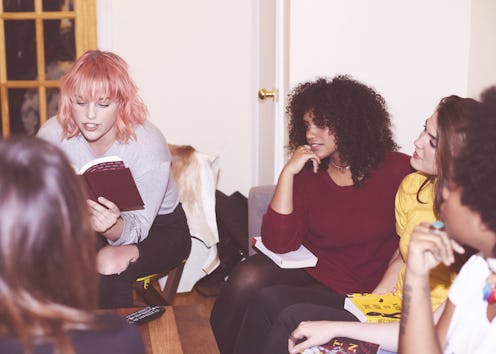
The Women's March on Washington just dropped Action No. 5, Reflect & Resist, part of a 100-day action plan designed to challenge the current administration. Included is a short list of five intersectional feminist books the Women's March recommends, along with a list of five articles and five films to watch.
If you're looking for strong media to fuel your activism, you couldn't do better than the intersectional feminist books, articles, and documentaries the Women's March recommends in its latest release. Combating problems within the movement itself, the Women's March has made it a point to include those marginalized communities that are often overlooked by White Feminists, including a takedown of White Feminism itself. As the release notes:
[O]ne cannot speak about feminism without acknowledging the dismal lack of representation for, and at times an active sidelining and silencing of the issues facing women of color, women with disabilities, sex workers, low-income women, and the LGBTQIA+ community.
Although the Women's March on Washington specifically asked privileged women to stay in their respective lanes during the Jan. 21 demonstration, and welcomed water protectors and other indigenous women to participate, many Native American and First Nations women came away with stories of horrendous disrespect by white participants. The Reflect & Resist reading list shows that the Women's March isn't letting White Feminists' ignorant actions slide.
Before we dive into the intersectional feminist books the Women's March recommends for your TBR this year, let's take a look at the articles and documentaries included in Action No. 5. They are:
- "Why Lemonade Is for Black Women" by Dominique Matti
- "This Is What I Mean When I Say 'White Feminism'" by Cate Young
- "They Pretend to Be Us While Pretending We Don't Exist" by Jenny Zhang
- "Self-Portraits" by Devan Diaz
- "Integrating Disability, Transforming Feminist Theory" by Rosemarie Garland-Thompson
- She's Beautiful When She's Angry
- Made in L.A.
- Major!
- Don't Tell Anyone (No Le Digas a Nadie)
- Free Angela and All Political Prisoners
Make it a priority to cross those articles and films off of your list this weekend, and get started on the books below today. The Women's March wants you "to share your own book, article and film selections and let us know how you’re participating in Action [No. 5]. Use the hashtag #ReflectAndResist on social media."
Here are the five intersectional feminist books the Women's March recommends to help you resist this administration.
1'This Bridge Called My Back: Writings by Radical Women of Color,' edited by Cherríe L. Moraga and Gloria E. Anzaldúa
This anthology edited by Chicana feminists Cherríe L. Moraga and Gloria E. Anzaldúa contains writings by black, Latina, Native American, and Asian feminists.
2'Feminism Is for Everybody' by Bell Hooks
Before We Should All Be Feminists, there was Feminism Is for Everybody, a primer on how feminism works to benefit people of all ages, races, classes, genders, and sexualities.
3'The Miner's Canary: Enlisting Race, Resisting Power, Transforming Democracy' by Lani Guinier and Gerald Torres
More than half a century after the Civil Rights Act of 1964 outlawed racial segregation and discrimination, the U.S. continues to fight and ignore persistent, systemic, institutionalized racism within its borders. In The Miner's Canary, Lani Guinier and Gerald Torres explore new strategies for eliminating racial prejudice.
4'Redefining Realness: My Path to Womanhood, Identity, Love & So Much More' by Janet Mock
Writer and editor Janet Mock's 2014 memoir, Redefining Realness, speaks up and out for women who are poor, trans, multiracial, and/or sex workers.
5'Fading Scars: My Queer Disability History' by Corbett Joan O'Toole
This Lambda Literary Award-nominated memoir is artist and disability-rights scholar Corbett Joan O'Toole's first book, covering landmark moments in the disability justice community that have taken place over the course of her life.